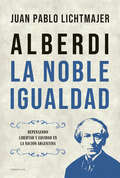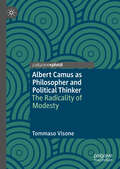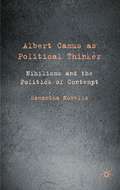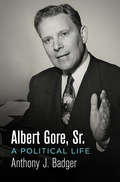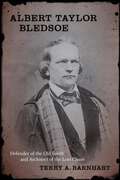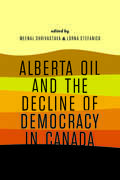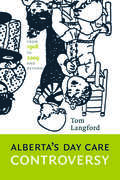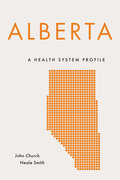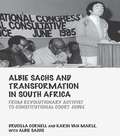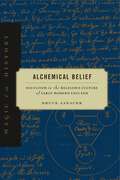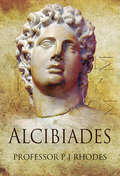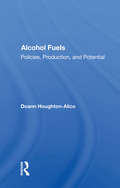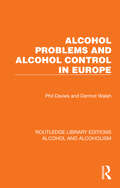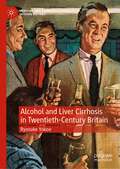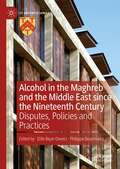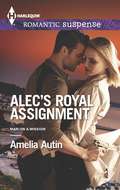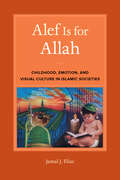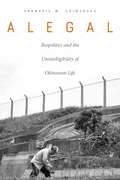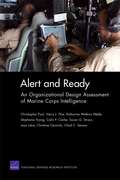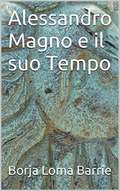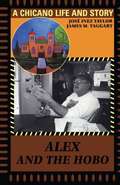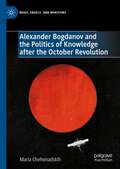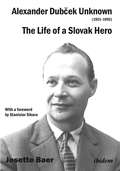- Table View
- List View
Alberdi: Repensando libertad y equidad en la nación argentina
by Juan Pablo LichtmajerUna lectura lúcida, reflexiva y rigurosa de la historia y actualidad de Alberdi para comprender cómo nació y se fue construyendo la identidad de la nación argentina y debatir el presente pensando quiénes fuimos, quiénes somos y quiénes queremos ser. Juan Bautista Alberdi y su obra son el objeto manifiesto de este libro cuyas páginas revelan bien pronto, desde una perspectiva absolutamente original, una ambición mayor: discutir el presente. En efecto, el recorrido de la historia de nuestro país desde el fin de la colonia hasta la organización nacional que Juan Pablo Lichtmajer traza siguiendo el devenir de la figura tal vez más importante de la Generación del 37 -nada menos que el autor intelectual de la Constitución de 1853- construye una lúcida lectura del pasado que interpela al hoy para señalar sus desafíos. En esa relación que establece con el tiempo actual se hace evidente uno de los propósitos más nítidos y una de las mayores fortalezas de este trabajo: releer a Alberdi para pensar la Argentina contemporánea. La empresa resulta exitosa porque entre sus muchos méritos propone ejes conceptuales en torno de los cuales nuclea los tópicos que despliega; uno de ellos, el de la identidad de la nación argentina. Historiográficamente riguroso, filosóficamente reflexivo y políticamente necesario, puede decirse de Alberdi: la noble igualdad que tiene deliberada vocación de indispensable.
Albert Camus as Philosopher and Political Thinker: The Radicality of Modesty
by Tommaso VisoneThis book explores the role of modesty in the thought of Albert Camus. Camusian modesty – modestie – affirms, against nihilism and absolutism, the necessity of taking care and putting passion into the relativity of human creation and recreation. The book shows how this care and passion spring from the necessity of a continually renewed tension between the self and the limits which transcend the self. From this standpoint, modesty is not a form of moderation; it goes to the root of human condition in face of the absurd. It is a radical attitude which engages human life in a daily struggle for meaning. With modesty in mind, Camus reimagined the relation between meaning and absurdity, history and nature, self and other, nation state and continent, global north and south, and war and peace. In a world of arrogance, narcissism, and fear, Camus’ philosophical and political insights are fundamental in order to re-think and re-imagine our present.
Albert Camus as Political Thinker
by Samantha NovelloAn intense genealogical reconstruction of Camus's political thinking challenging the philosophical import of his writings as providing an alternative, aesthetic understanding of politics, political action and freedom outside and against the nihilistic categories of modern political philosophy and the contemporary politics of contempt and terrorisms
Albert Einstein: Scientist of the 20th Century
by Catherine ReefA biography of physicist Albert Einstein, the man who put forth the general theory of relativity.
Albert Gore, Sr.: A Political Life (Politics and Culture in Modern America)
by Anthony J. BadgerIn chronicling the life and career of Albert Gore, Sr., historian Anthony J. Badger seeks not just to explore the successes and failures of an important political figure who spent more than three decades in the national eye—and whose son would become Vice President of the United States—but also to explain the dramatic changes in the South that led to national political realignment.Born on a small farm in the hills of Tennessee, Gore served in Congress from 1938 to 1970, first in the House of Representatives and then in the Senate. During that time, the United States became a global superpower and the South a two party desegregated region. Gore, whom Badger describes as a policy-oriented liberal, saw the federal government as the answer to the South's problems. He held a resilient faith, according to Badger, in the federal government to regulate wages and prices in World War II, to further social welfare through the New Deal and the Great Society, and to promote economic growth and transform the infrastructure of the South.Gore worked to make Tennessee the "atomic capital" of the nation and to protect the Tennessee Valley Authority, while at the same time cosponsoring legislation to create the national highway system. He was more cautious in his approach to civil rights; though bolder than his moderate Southern peers, he struggled to adjust to the shifting political ground of the 1960s. His career was defined by his relationship with Lyndon Johnson, whose Vietnam policies Gore bitterly opposed. The injection of Christian perspectives into the state's politics ultimately distanced Gore's worldview from that of his constituents. Altogether, Gore's political rise and fall, Badger argues, illuminates the significance of race, religion, and class in the creation of the modern South.
Albert Taylor Bledsoe: Defender of the Old South and Architect of the Lost Cause (Southern Biography Series)
by Terry A. BarnhartAlbert Taylor Bledsoe (1809--1877), a principal architect of the South's "Lost Cause" mythology, remains one of the Civil War generation's most controversial intellectuals. In Albert Taylor Bledsoe: Defender of the Old South and Architect of the Lost Cause, Terry A. Barnhart sheds new light on this provocative figure.Bledsoe gained a respectable reputation in the 1840s and 1850s as a metaphysician and speculative theologian. His two major works, An Examination of President Edwards' Inquiry into the Freedom of the Will (1845) and A Theodicy; Or, Vindication of the Divine Glory, As Manifested in the Constitution and Government of the Moral World (1853), grapple with perplexing problems connected with causality, Christian theology, and moral philosophy. His fervent defense of slavery and the constitutional right of secession, however, solidified Bledsoe as one of the chief proponents of the idea of the Old South. In An Essay on Liberty and Slavery (1856), he assailed egalitarianism and promoted the institution of slavery as a positive good. A decade later, he continued to devote himself to fashioning the "Lost Cause" narrative as the editor and proprietor of the Southern Review from 1867 until his death in 1877. He carried on a literary tradition aimed to reconcile white southerners to what he and they viewed as the indignity of their defeat by sanctifying their lost cause. Those who fought for the Confederacy, he argued, were not traitors but honorable men who sacrificed for noble reasons.This biography skillfully weaves Bledsoe's extraordinary life history into a narrative that illustrates the events that shaped his opinions and influenced his writings. Barnhart demonstrates how Bledsoe still speaks directly, and sometimes eloquently, to the core issues that divided the nation in the 1860s and continue to haunt it today.
Alberta Oil and the Decline of Democracy in Canada
by Paul Kellogg Bob Barnetson Gabrielle Slowey Jason Foster Josh Evans Joy Fraser Karen Wall Lorna Stefanick Manijeh Mannani Meenal Shrivastava Peter Jay Smith Ricardo Acuna Sara Dorow Trevor HarrisonPrior to May 2015, the oil-rich jurisdiction of Alberta had, for over four decades, been a one-party state. During that time, the rule of the Progressive Conservatives essentially went unchallenged, with critiques of government policy falling on deaf ears and Alberta ranking behind other provinces in voter turnout. Given the province’s economic reliance on oil revenues, a symbiotic relationship also developed between government and the oil industry. Cross-national studies have detected a correlation between oil-dependent economies and authoritarian rule, a pattern particularly evident in Africa and the Middle East. Alberta Oil and the Decline of Democracy in Canada sets out to test the “oil inhibits democracy” hypothesis in the context of an industrialized nation in the Global North. In probing the impact of Alberta’s powerful oil lobby on the health of democracy in the province, contributors to the volume engage with an ongoing discussion of the erosion of political liberalism in the West. In addition to examining energy policy and issues of government accountability in Alberta, they explore the ramifications of oil dependence in areas such as Aboriginal rights, environmental policy, labour law, women’s equity, urban social policy, and the arts. If, as they argue, reliance on oil has weakened democratic structures in Alberta, then what of Canada as whole, where the short-term priorities of the oil industry continue to shape federal policy? In Alberta, the New Democratic Party is in a position to reverse the democratic deficit that is presently fuelling political and economic inequality. The findings in this book suggest that, to revitalize democracy, provincial and federal leaders alike must find the courage to curb the influence of the oil industry on governance.
Alberta's Day Care Controversy: From 1908 to 2009 and Beyond
by Tom LangfordDay care in Alberta has had a remarkably durable history as a controversial issue. Since the late 1950s, disputes over day care programs, policies, and funding have been a recurring feature of political life in the province. Alberta’s Day Care Controversy traces the development of day care policies and programs in Alberta, with particular emphasis on policy decisions and program initiatives that have provoked considerable debate and struggle among citizens. For most of Alberta’s first fifty years as a province, day care was treated as a private rather than a public issue. Beginning in the late 1950s, however, debates about day care began to appear regularly on the public record. Dr. Tom Langford brings to light the public controversies that occurred during the last four decades of the twentieth century and the first decade of the new millennium, placing contemporary issues in historical context and anticipating the elements of future policy struggles.
Alberta: A Health System Profile (Provincial and Territorial Health System Profiles)
by John Church Neale SmithAlberta: A Health System Profile provides the first detailed description of Alberta’s health care system and the underpinning political and social forces that have shaped it. Drawing on significant wealth from government revenues generated through the energy sector, Alberta has been able to develop an extensive public health and health care infrastructure. Alberta has used its financial resources to attract health professionals by offering the highest levels of financial compensation in Canada. However, although it spends more per capita than other Canadian jurisdictions, Alberta’s health care system costs and health outcomes are mediocre compared to those of many other Canadian jurisdictions. This unexpected outcome is the consequence of the unique interplay of economic and political forces within Alberta’s political economy. Through an examination of Alberta’s political and economic history, and using research on the structures and services provided, Alberta: A Health Systems Profile provides a detailed description of the programs and services that constitute Alberta’s health care system.
Albie Sachs and Transformation in South Africa: From Revolutionary Activist to Constitutional Court Judge (Birkbeck Law Press)
by Albie Sachs Drucilla Cornell Karin van MarleMany critical theorists talk and write about the day after the revolution, but few have actually participated in the constitution of a revolutionary government. Emeritus Justice Albie Sachs was a freedom fighter for most of his life. He then played a major role in the negotiating committee for the new constitution of South Africa, and was subsequently appointed to the new Constitutional Court of South Africa. Therefore, the question of what it means to make the transition from a freedom fighter to a participant in a revolutionary government is not abstract, in Hegel’s sense of the word, it is an actual journey that Albie Sachs undertook. The essays in this book raise the complex question of what it actually means to make this transition without selling out to the demands of realism. In addition, the preface written by Emeritus Justice Albie Sachs and his interview with Drucilla Cornell and Karin van Marle, further address key questions about revolution in the twentieth- and twenty-first centuries: from armed struggle to the organization of a nation state committed to ethical transformation in the name of justice. Albie Sachs and transformation in South Africa: from revolutionary activist to constitutional court judge illuminates the theoretical and practical experiences of revolution and its political aftermath. With first-hand accounts alongside academic interrogation, this unique book will intrigue anyone interested in the intersection of Law and Politics.
Alchemical Belief: Occultism in the Religious Culture of Early Modern England (Magic in History)
by Bruce JanacekWhat did it mean to believe in alchemy in early modern England? In this book, Bruce Janacek considers alchemical beliefs in the context of the writings of Thomas Tymme, Robert Fludd, Francis Bacon, Sir Kenelm Digby, and Elias Ashmole. Rather than examine alchemy from a scientific or medical perspective, Janacek presents it as integrated into the broader political, philosophical, and religious upheavals of the first half of the seventeenth century, arguing that the interest of these elite figures in alchemy was part of an understanding that supported their national—and in some cases royalist—loyalty and theological orthodoxy. Janacek investigates how and why individuals who supported or were actually placed at the traditional center of power in England’s church and state believed in the relevance of alchemy at a time when their society, their government, their careers, and, in some cases, their very lives were at stake.
Alchemical Belief: Occultism in the Religious Culture of Early Modern England (Magic in History)
by Bruce JanacekWhat did it mean to believe in alchemy in early modern England? In this book, Bruce Janacek considers alchemical beliefs in the context of the writings of Thomas Tymme, Robert Fludd, Francis Bacon, Sir Kenelm Digby, and Elias Ashmole. Rather than examine alchemy from a scientific or medical perspective, Janacek presents it as integrated into the broader political, philosophical, and religious upheavals of the first half of the seventeenth century, arguing that the interest of these elite figures in alchemy was part of an understanding that supported their national—and in some cases royalist—loyalty and theological orthodoxy. Janacek investigates how and why individuals who supported or were actually placed at the traditional center of power in England’s church and state believed in the relevance of alchemy at a time when their society, their government, their careers, and, in some cases, their very lives were at stake.
Alcibiades
by P. J. RhodesWhile the Americans were fighting in Vietnam, a struggle of even greater strategic significance was taking place in the Middle East: the Sultanate of Oman guards the entrance to the Arabian Gulf, and thus controls the movement of oil from that region. In the 1960s and 70s, the Communists tried to seize this artery and, had they succeeded, the consequences for the West and for the Middle East would have been disastrous — and yet, few people have ever heard of this geo-political drama at the height of the Cold War.In the Service of the Sultan tells, first-hand, the largely unknown story of a small number of British officers who led Muslim soldiers in this hard-fought anti-insurgency war which has shaped todays Gulf. After outlining the historical, geographical and political background, the book describes military action in a stark and mountainous environment, including operations with irregular forces and the SAS as well as action in the air and at sea. The book gives a gripping, moving, funny account of all these and paints a powerful and illuminating picture of the realities of war.It will appeal to all who are interested in the Cold War and relationships between the Western and the Arab worlds. Politics, history, irregular warfare, religion, international affairs: all are ingredients in this absorbing, informative read. In the light of the current insurgencies in Iraq and Afghanistan, it is also timely to be reminded how a rare victory was won over Communist guerrillas.
Alcohol Fuels: Policies, Production, And Potential
by Doann Houghton-alicoSince the 1973 OPEC oil crisis, the rise of imported crude oil prices, and the questionable availability of petroleum supplies, the United States has been forced to investigate liquid-fuel alternatives. Alcohol fuels, including methanol and ethanol, offer the most realistic near-term potential as gasoline extenders or substitutes. This book is the
Alcohol Problems and Alcohol Control in Europe (Routledge Library Editions: Alcohol and Alcoholism)
by Dermot Walsh Phil DaviesThe nature of alcohol problems is very diverse and the strategies adopted for minimising these vary even more. Thinking in the study of alcohol problems in the 1970s and early 1980s had focused on the public health perspective, seeking not only to lessen alcohol problems by controlling the availability of alcohol, but also to promote moderate drinking practices and to preserve the positive advantages of alcohol use. Originally published in 1983, a detailed review of public health issues in this field at the time opens the book. This is followed by an examination of alcohol-related problems and policies for their control in sixteen different European countries. The chapters on individual countries provide a source of information and data on alcohol policies, consumption and problems with which it is possible to examine from a cross-cultural and comparative basis the claims of a public health perspective. The final chapter draws together the cross-national data and discusses their implications for a public health response to alcohol problems. This book should now be a historical reference source for all interested in health policy in general and alcohol problems in particular.
Alcohol and Liver Cirrhosis in Twentieth-Century Britain (Medicine and Biomedical Sciences in Modern History)
by Ryosuke YokoeThe relationship between alcohol consumption and liver cirrhosis has long been contested by doctors and medical professionals, creating numerous implications for the public reputation of alcohol in Britain. Despite this, it was not until the 1970s that cirrhosis came to be understood as an ‘alcoholic disease’. This book contextualises developments in this debate through the twentieth century by examining the significant influence that medical expertise had on policy responses to alcohol misuse, as well as the social reputation of alcohol consumption. It demonstrates how the degree to which drinking was seen to be responsible for liver disease directly shaped how different groups, such as the temperance movement and the drinks industry, exaggerated or downplayed the destructive properties of alcohol. Covering a series of themes including the science of disease causation, the social standing of medical expertise, and alcohol and public health policy, this book argues that in order to properly understand the trajectory of debates around drinking we need to consider the twentieth-century ‘alcohol problem’ as primarily a medical issue. Contrary to the tendency by existing works to disassociate perceptions and responses to alcohol use from the objective knowledge of its effects on the body, this book shows that medical understandings of liver disease influenced how alcohol was conceptualised in relation to its harms. Offering a fresh perspective on the interaction between scientific knowledge and policy during the twentieth century, this book provides insights for those researching the social, political and cultural history of modern Britain, as well as historians of medicine and health.
Alcohol in the Maghreb and the Middle East since the Nineteenth Century: Disputes, Policies and Practices (St Antony's Series)
by Elife Biçer-Deveci Philippe BourmaudThis book explores the significance of alcohol in the Middle East and Maghreb as a powerful catalyst of social and political division. It shows that the solidarities and polarities created by disputes over alcohol are built on arguments far more complex than oppositions on religion or consumption alone. In a region in which alcohol is banned by Islamic rules, yet allows its production and consumption, alcohol has always been contentious. However, this volume examines the different forms of social authority – religious, cultural and political – to offer a new understanding of drinking behaviours in the Middle East and North Africa. It suggests that alcohol, being at the same time an import and product of local industry, epitomises the tensions inherent to the conforming of Islamic societies to global trends, which seek to redefine political communities, social hierarchies and gender roles. The chapters challenge common misconceptions about alcohol in this region, arguing instead that medical discourses on alcohol dependency hide stances on national independence in an imperialist context; that the focus on religion also tends to conceal disputes on alcohol as a social struggle; and that disputes on inebriation are more about masculinity than judging private leisure. In doing so, the volume presents alcohol as a way of grasping the power relations that structure the societies of the Middle East and Maghreb.
Alec's Royal Assignment
by Amelia AutinIn the Man on a Mission series, a special agent becomes one woman's most dangerous weakness... Bodyguard to the queen of Zakhar, lieutenant Angelina Mateja is unwilling to risk her reputation or her job for US special agent Alec Jones-no matter how sexy and irresistible he is. Alec's been recruited by the king to root out a human trafficking ring-not get up close and personal with a stunning woman who practically radiates touch me and die. But after sharing a mind-blowing kiss, Alec can't deny the fire simmering beneath Angel's cool exterior. As the danger-and their attraction-intensifies, Angel is forced to choose between the job of her dreams, and the man who is starting to occupy her heart...
Alef Is for Allah: Childhood, Emotion, and Visual Culture in Islamic Societies
by Jamal J. EliasAlef Is for Allah is the first groundbreaking study of the emotional space occupied by children in modern Islamic societies. Focusing primarily on visual representations of children from modern Turkey, Iran, and Pakistan, the book examines these materials to investigate concepts such as innocence, cuteness, gender, virtue, and devotion, as well as community, nationhood, violence, and sacrifice. In addition to exploring a subject that has never been studied comparatively before, Alef Is for Allah extends the boundaries of scholarship on emotion, religion, and visual culture and provides unique insight into Islam as it is lived and experienced in the modern world.
Alegal: Biopolitics and the Unintelligibility of Okinawan Life
by Annmaria M. ShimabukuOkinawan life, at the crossroads of American militarism and Japanese capitalism, embodies a fundamental contradiction to the myth of the monoethnic state. Suspended in a state of exception, Okinawa has never been an official colony of the Japanese empire or the United States, nor has it ever been treated as an equal part of Japan. As a result, Okinawans live amid one of the densest concentrations of U.S. military bases in the world. By bringing Foucauldian biopolitics into conversation with Japanese Marxian theory, Alegal uncovers Japan’s determination to protect its middle class from the racialized sexual contact around its mainland bases by displacing them onto Okinawa, while simultaneously upholding Okinawa as a symbol of the infringement of Japanese sovereignty.This symbolism, however, has provoked ambivalence within Okinawa. In base towns that facilitated encounters between G.I.s and Okinawan women, the racial politics of the United States collided with the postcolonial politics of the Asia Pacific. Through close readings of poetry, reportage, film, and memoir on base-town life since 1945, Shimabuku traces a continuing failure to “become Japanese.” What she discerns instead is a complex politics surrounding sex work, tipping with volatility along the razor’s edge between insurgency and collaboration. At stake in sovereign powers’ attempt to secure Okinawa as a military fortress was the need to contain alegality itself—that is, a life force irreducible to the legal order. If biopolitics is the state’s attempt to monopolize life, then Alegal is a story about how borderland actors reclaimed its power for themselves.
Alert and Ready: An Organizational Design Assessment of Marine Corps Intelligence
by Christopher Paul Colin P. Clarke Harry J. Thie Stephanie Young Katharine Watkins WebbOver the past decade, especially, U.S. Marine Corps (USMC) intelligence has had to tailor its organization to meet the evolving demands of the operational environment. This has resulted in a number of ad hoc arrangements, practices, and organizations. A broad review of the organizational design of USMC intelligence examined how to align it efficiently and effectively with current and future missions and functions.
Alessandro Magno e il suo tempo
by Marcella Martelli Borja Loma BarrieRomanzo storico. Biografia. La vita di Alessandro Magno. Il rapporto con Aristotele, il grande filosofo, suo tutore, e con il re Filippo, suo padre, odiato dai greci. Come schiacciò la sedizione promossa dal meditatore Callistene, pronipote di Aristotele, che ordinò di crocifiggere. Il suo amore folle per Calquetón, ballerino persiano. La conquista dell'Asia. La sua morte in un baccanale
Alex and the Hobo: A Chicano Life and Story
by Taylor James M. Taggart José InezWhen a ten-year-old boy befriends a mysterious hobo in his southern Colorado hometown in the early 1940s, he learns about evil in his community and takes his first steps toward manhood by attempting to protect his new friend from corrupt officials. Though a fictional story, Alex and the Hobo is written out of the life experiences of its author, José Inez (Joe) Taylor, and it realistically portrays a boy's coming-of-age as a Spanish-speaking man who must carve out an honorable place for himself in a class-stratified and Anglo-dominated society. In this innovative ethnography, anthropologist James Taggart collaborates with Joe Taylor to explore how Alex and the Hobo sprang from Taylor's life experiences and how it presents an insider's view of Mexicano culture and its constructions of manhood. They frame the story (included in its entirety) with chapters that discuss how it encapsulates notions that Taylor learned from the Chicano movement, the farmworkers' union, his community, his father, his mother, and his religion. Taggart gives the ethnography a solid theoretical underpinning by discussing how the story and Taylor's account of how he created it represent an act of resistance to the class system that Taylor perceives as destroying his native culture.
Alexander Bogdanov and the Politics of Knowledge after the October Revolution (Marx, Engels, and Marxisms)
by Maria ChehonadskihIn this book, Maria Chehonadskih unsettles established narratives about the formation of a revolutionary canon after the October Revolution. Displacing the centre of gravity from dialectical materialism to the rapid dissemination, canonisation and decline of a striking convergence of empiricism and Marxism, she explores how this tendency, overshadowed by official historiography, establishes a new attitude to modernity and progress, nature and environment, agency and subjectivity, party and class, knowledge and power. The book traces the adventure of the synthesis of empiricism and Marxism across philosophy, science, politics, art and literature from the 1890s to the 1930s, offering a radical rethinking of the true scope and scale that the main proponent of Empirio-Marxism, Alexander Bogdanov, had on the post-revolutionary socialist legacies. Chehonadskih draws on both key and forgotten figures and movements, such as Proletkult, Productivism and Constructivism, filling a gap in the literature that will be particularly significant for Marxism, continental philosophy, art theory and Slavic studies specialists.
Alexander Dubček Unknown (1921–1992): The Life of a Political Icon
by Josette Baer HillAlexander Dubček is well-known, so one might think; nothing new can be written about him. Is this true? Dubček is the symbol of the Czechoslovak attempt to reform communism that gained worldwide admiration in 1968. The invasion of Warsaw Pact troops in the night of August 21, 1968 set a brutal end to the Prague Spring.Josette Baer’s new biography focuses on Dubček’s early years, his childhood in Soviet Kirghizia, his participation in the Slovak National Uprising in 1944 against Nazi Germany and the Slovak clerical-fascist government, and his career in the Slovak Communist Party in the late 1950s and early 1960s. <P><P> It offers new insights into the political thought of the father of “Socialism with a Human Face,” based on archive material available to the Western reader for the first time. Who was Alexander Dubček—a naïve apparatchik, an independent thinker, a courageous liberator, or a political dreamer?
